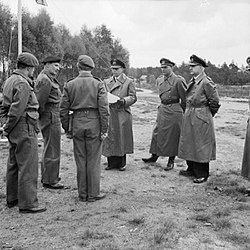Derek Knee
This article needs additional citations for verification. (March 2024) |
Derek Knee | |
|---|---|
 Captain Derek Knee (third from left) at the arrival of the delegation for the German surrender at Lüneburg Heath, 3 May 1945. | |
| Born | 22 October 1922 Cheltenham, Gloucestershire, England |
| Died | 18 March 2014 (aged 91) |
| Allegiance | |
| Service | |
| Rank | Captain |
| Unit | Dorsetshire Regiment |
| Battles / wars | World War II |
Captain Derek Knee (22 October 1922 – 18 March 2014) was a British Army intelligence officer of the British Army during World War II. He was the interpreter and translator for Field Marshal Sir Bernard Montgomery, commander of the Anglo-Canadian 21st Army Group, at the German surrender at Lüneburg Heath in Germany on 3 May 1945.[1]
Early life and service in World War II
[edit]This section needs additional citations for verification. (March 2024) |
Knee attended Cheltenham Grammar School where his father was the headmaster and he spent a summer with a family in Germany which helped him to become fluent in the language.[1] He then read Modern Languages at Christ's College, Cambridge for a year until he was commissioned as an officer in the Dorset Regiment.[citation needed] His language skills led to postings to a course on the interrogation of Prisoners of War and to a censorship unit in London.[citation needed] After D-Day he served at Second Army Headquarters under General Miles Dempsey, identifying German units and estimating their strengths.[citation needed]
German Surrender
[edit]On 2 May 1945 Knee was told to report to Field Marshal Montgomery’s 21st Army Group Tactical Headquarters on Lüneburg Heath the next day where a German delegation arrived with a letter from Field Marshal Wilhelm Keitel which he translated for Montgomery. He reported that they did not have the authority to agree to the unconditional surrender terms stipulated by Montgomery and they were provided with a lunch with wine and brandy. The next day they returned with another delegate and signed the surrender document in a carpeted tent witnessed by war correspondents. Knee was later directed to travel to Flensburg to take Karl Dönitz into custody and transport him to the airport. Upon his return to Lüneburg he saw the body of Heinrich Himmler who had committed suicide in British custody.
Later life
[edit]Upon his return to his studies at Cambridge University Knee switched to an Economics course and he became assistant general secretary at the International Association of Department Stores in Paris and Geneva. Upon his retirement he moved to Barry, Vale of Glamorgan, Wales. He was married with two sons.[1][2]
See also
[edit]References
[edit]- ^ a b c "Veteran remembers 'war of words'". BBC News. 4 May 2005. Retrieved 24 May 2014.
- ^ Derek Knee Daily Telegraph Obituary retrieved 24 May 2014
